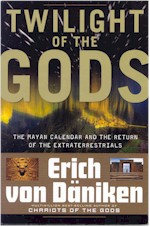 |
|
|
| ||||||
|
|
This page is the original source of this review, though you may also find it on Amazon or other sites. | ||
| Book Reviews Home | Free Audio Books | |
 |
Book Review of: Twilight of the GodsThe Mayan calendar and the return of the extraterrestrials Price: $10.98 Availability: Usually ships within 24 hours |
| Review of
Twilight of the Gods, by Erich von Daniken (Softcover, 2011) (You can print this review in landscape mode, if you want a hardcopy) Reviewer: Mark Lamendola, author of over 6,000 articles. His iconic book, Chariot of the Gods, not only fueled a counterculture but also became a hit in the main culture. Even after some three dozen books, Erich von Daniken continues to enrapt readers with his provocative thinking, irrefutable evidence, and clear logic. Plus some anomalies that have astute readers grimacing.... Whether his information and conclusions are correct is almost irrelevant to many readers (count me in that group). His books are always worth reading, because they are a pleasure to read. Even with so many books under his belt, von Daniken has written yet another jewel. Not that it doesn't have its problems. For example:
Why is that last bullet point an issue? Well, let's talk facts. Anyone closely examining the syntax in the BoM can see it attempts to mimic the syntax of the King James Bible, but does so with many errors. If this book is the recording of tablets revealed by an angel, why the errors? Exactly. The errors exist because Joseph Smith tried to "sound" authentic. At the time he wrote this book, many English speaking Protestants thought the language of the King James Bible was how God actually talked. Not Latin, Aramaic, Greek, or Hebrew. No, God spoke in 1611 English because any dern fool can see that's what the Bible's writ in. Even today, many Protestants use "thee" and "thou" in religious contexts/settings because, to quote one Arkansan, "Them's reverent words." As he wasn't well-educated, Joseph Smith didn't know any different. His Bible knowledge gap, which of course an angel would not have, shows in the clumsy construction and mangled syntax of what he wrote. You don't have to be a linguist to see this. It's yet another example of how von Daniken doesn't practice discernment in looking at sources. It would be nice if von Daniken didn't make these kinds of errors, but long-time von Daniken fans are used to it and keep coming back for more. Over the years, von Daniken has repeatedly used errors of fact in making his arguments. In this book, he does that yet again. However, he also has incontrovertible facts and where those undergird his arguments he makes a solid case. As is his custom. He also relies more heavily on actual artifacts than on theory or reconstructions. In this book, he's included a large number of photos of such artifacts.
Yes, von Daniken is controversial. That does make his books entertaining. But that isn't their only value. He also raises questions that are impossible to answer via our current "book of knowledge." His "alternative" explanation, namely extraterrestrials, becomes the only sensible explanation almost by default. While von Daniken does not always get his facts right, there is a fact that is yet again proven by this book. The purchase of a von Daniken book is never a waste of money. This book spans 195 pages, consists of 5 chapters, includes many interesting drawings, and includes many amazing photographs of actual sites and actual artifacts. | |
About these reviewsYou may be wondering why the reviews here are any different from the hundreds of "reviews" posted online. Notice the quotation marks? I've been reviewing books for sites like Amazon for many years now, and it dismays me that Amazon found it necessary to post a minimum word count for reviews. It further dismays me that it's only 20 words. If that's all you have to say about a book, why bother? And why waste everyone else's time with such drivel? As a reader of such reviews, I feel like I am being told that I do not matter. The flippancy of people who write these terse "reviews" is insulting to the authors also, I would suspect. This sound bite blathering taking the place of any actual communication is increasingly a problem in our mindless, blog-posting Webosphere. Sadly, Google rewards such pointlessness as "content" so we just get more if this inanity. My reviews, contrary to current (non) standards, actually tell you about the book. I always got an "A" on a book review I did as a kid (that's how I remember it anyhow, and it's my story so I'm sticking to it). A book review contains certain elements and has a logical structure. It informs the reader about the book. A book review may also tell the reader whether the reviewer liked it, but revealing a reviewer's personal taste is not necessary for an informative book review. About your reviewer
About reading styleNo, I do not "speed read" through these. That said, I do read at a fast rate. But, in contrast to speed reading, I read everything when I read a book for review. Speed reading is a specialized type of reading that requires skipping text as you go. Using this technique, I've been able to consistently "max out" a speed reading machine at 2080 words per minute with 80% comprehension. This method is great if you are out to show how fast you can read. But I didn't use it in graduate school and I don't use it now. I think it takes the joy out of reading, and that pleasure is a big part of why I read. |
| |||||